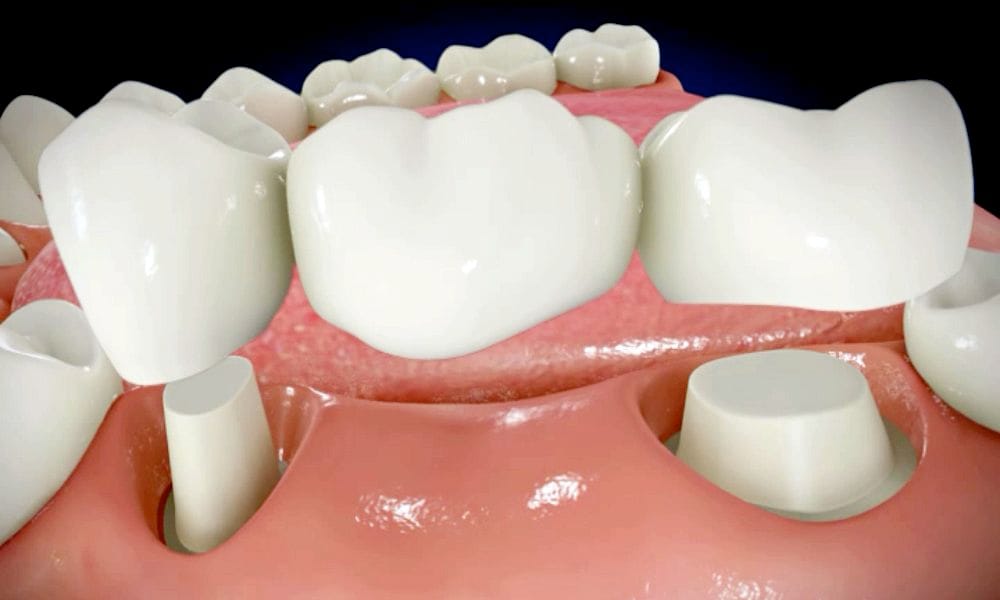Are you worried about the cost of replacing a missing tooth? You’re not alone. Dental bridges offer a popular solution, but their prices can leave many scratching their heads. Don’t fret! We’ve got you covered with a comprehensive guide to dental bridge costs in 2025.
Did you know that the average lifespan of a dental bridge is 5 to 15 years, with a 94% survival rate after three years? This makes them a smart investment for your smile and oral health. In this article, we’ll break down the factors that affect dental bridge prices, explore different types and their costs, and share tips to help you find affordable options.
Ready to uncover the true cost of a dental bridge and make an informed choice for your smile? Let’s get started with a clear, no-nonsense look at what you can expect to pay and why.
Types of Dental Bridges and Their Costs
Traditional Dental Bridge
A traditional dental bridge is the most common type, involving the creation of a crown for the tooth or implant on either side of the gap left by a missing tooth. A pontic (false tooth) is placed in between these crowns.
- Cost Range: $2,000 – $5,000 per pontic and crown for each abutment tooth.
Cantilever Dental Bridge
Cantilever bridges are similar to traditional ones but are used when there is only one adjacent tooth next to the missing tooth.
- Cost Range: $1,000 – $4,000.
Maryland Dental Bridge (Resin-Bonded Bridge)
Maryland bridges utilize a metal or porcelain framework bonded to the back of adjacent teeth. This type is often preferred for front teeth due to its aesthetic appeal.
- Cost Range: $1,200 – $2,910.
Implant-Supported Dental Bridge
Implant-supported bridges are anchored by dental implants instead of crowns or frameworks. This option is typically used when multiple teeth are missing.
- Cost Range: $5,000 – $15,000.
Factors Influencing Dental Bridge Costs
Understanding the factors that affect dental bridge prices can help you prepare financially:
- Material Choice:
- Porcelain: Offers a natural appearance but tends to be more expensive.
- Metal Alloys: Durable but less aesthetically pleasing.
- Zirconia: Highly durable and natural-looking but comes at a higher price point.
- Location:
The geographical location of your dental clinic can significantly impact costs. Urban areas often have higher prices due to increased overhead expenses compared to rural settings. - Complexity of the Procedure:
The complexity involved in placing a dental bridge—such as the number of teeth being replaced and the condition of surrounding teeth and gums—can influence overall costs. More complex cases require additional time and resources, leading to higher prices. - Dentist’s Expertise:
Experienced dentists may charge more for their services due to their advanced skills and quality care. However, investing in expertise can lead to better long-term outcomes and potentially fewer follow-up visits. - Additional Procedures:
If you require additional treatments like tooth extractions or root canals before getting a dental bridge, these will add to your total cost.
Detailed Cost Breakdown
Here’s a closer look at potential costs associated with getting a dental bridge:
- Initial Consultation and Examination: $50 – $200
- X-Rays: $90 – $150
- Dental Bridge (Per Unit): $700 – $1,500
- Dental Bridge Installation: $200 – $500
- Follow-up Visits: $50 – $200
Alternatives to Dental Bridges
If you’re considering options beyond dental bridges, here are two alternatives:
- Partial Dentures: Removable and often more economical than fixed bridges. However, they may not provide the same comfort or effectiveness.
- Dental Implants: A more permanent solution that offers better stability and durability but comes with a higher cost and requires oral surgery.
Conclusion
The cost of a dental bridge can vary significantly based on factors such as type, materials used, location, and procedure complexity. It’s crucial to consult with your dentist for a detailed estimate tailored to your specific needs. Exploring options like insurance coverage and financing plans can further assist you in making an informed decision about your oral health while staying within your budget.
By understanding these elements surrounding dental bridges, you can approach your treatment with confidence and clarity.















